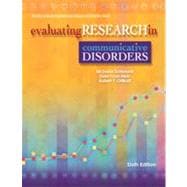A carefully organized and engaging comprehensive guide to analyzing research articles.
Extensively revised and updated in its sixth edition, Evaluating Research in Communicative Disorders teaches both students and practitioners to read, understand, and evaluate research published in communicative sciences and disorders journals. With an emphasis on scientific principals and scientific inquiry, this richly illustrated and interactive text provides a solid foundation for clinical practice for all levels of readers by linking research information on treatment efficacy to direct clinical applications.
The sixth edition of Evaluating Research in Communicative Disorders has been reorganized to reflect the structure typically found in a research articles. Accompanied by helpful tables and figures, each chapter begins with an outline and concludes with a list of key terms and a newly developed set of study questions.








